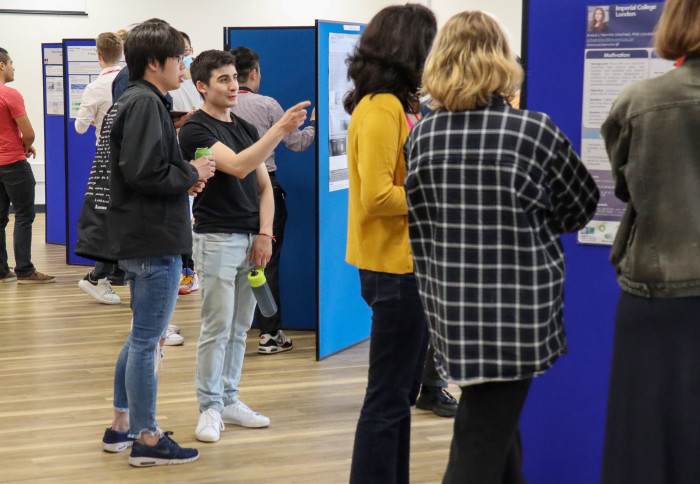Chemical Engineering PhD students showcase their work at annual symposium

PhD students delivered poster and oral presentations on their research, for which prizes were awarded.
PhD students in the Department Chemical Engineering were given the opportunity to showcase their cutting-edge research to staff and students across Imperial College London. The annual PhD symposium has been running since 2006, but this year’s event was the first in-person symposium since March 2020.
The event showed off the incredible breadth and quality of research carried out within the department, with topics from biotechnology to carbon capture covered, making the judge’s decision incredibly challenging. Prizes were available for the best oral and poster presentations, with one competition judged by a panel of academics and the second based on attendees’ votes.
The event was opened with a keynote lecture from Dr Maria Papathanasiou, an academic within the department whose work focuses on the development of digital twins for process simulation, optimisation and control. Her talk, titled ‘Chemical Engineering, myself and academia’, gave an insightful look into how she became an academic and how she spends her teaching and research time. The lecture was a fitting start to the event and was followed by eighteen PhD presentations over the course of the day.
Highlights of the morning session included a presentation from Frederik J. Link focusing on de-bottlenecking downstream purification of biopharmaceutical proteins via crystallisation – a significantly greener and economic method to purify these life-saving therapeutics. He demonstrated that tuning the solution properties is an excellent method to facilitate and advance the crystallisation of the protein human insulin, representing a significant step towards the design of novel crystallisation pathways applicable for industrial use.
During the lunch break the poster session was held, with Miriam Sarkis winning the best poster presentation. Her work focuses on developing a computer-aided modelling and optimisation framework for the design and operation of supply chains for advanced pharmaceuticals, such as cell and gene therapies. Specifically, her poster outlined a methodology to characterise manufacturing uncertainties for processes under development and assess how these may lead to alternative supply chain network structures and costs.
Theses identified trends can be used to better inform investment planning decisions during scale-up from clinical to commercial operations. Improving supply chain resilience to demand and manufacturing uncertainty would help ensure patient accessibility to these ground-breaking therapies as more products reach market approval.
Other stand out presentations included an oral presentation from Anna-Maria Eckel, winner of both afternoon judging sessions. Her work, focusing on carbon capture and storage, outlined the novel application of X-ray Computed Tomography scans to study convective mixing in 3D structures such as rock samples. Her results and observations provided more representative information for the investigation of convective mixing in the context of carbon capture and storage and the selection and evaluation of carbon sequestration sites, which may prove vital in mitigating climate change.
Congratulations to all prize winners and participants!
Full prize winners are below.
-
Posters
Academic panel choice:
1st prize: Miriam Sarkis
2nd prize: Anouk L'Hermitte
3rd prize: Adam Ward
Popular vote:
1st prize: Athanasios Antonakoudis
2nd prize: Tarik Alkharusi
3rd prize: Kleio-Aikaterini Zervidi
Morning presentations
Academic panel choice:
1st prize: Frederik Jochen Link
2nd prize: Hassan Azzan
3rd prize: Roberto Di Blasi
Popular vote:
1st prize: Apanpreet Kaur
2nd prize: Frederik Jochen Link
3rd prize: Hassan Azzan
Afternoon presentations
Academic panel choice:
1st prize: Anna-Maria Eckel
2nd prize: Junyi Cui
3rd prize: Annabelle Tan
Popular vote:
1st prize: Anna-Maria Eckel
2nd prize: Annabelle Tan
3rd prize: Tanuj Karia
Article text (excluding photos or graphics) © Imperial College London.
Photos and graphics subject to third party copyright used with permission or © Imperial College London.
Reporter
Benjamin Strain
Department of Chemical Engineering